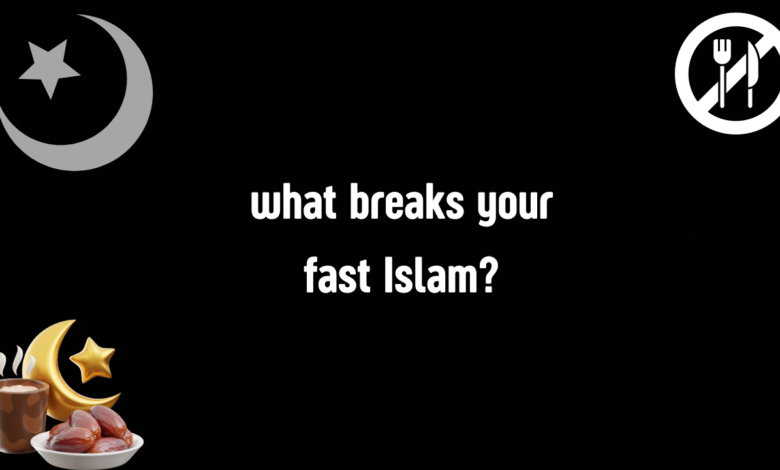what breaks your fast Islam?

Introduction
Fasting during the holy month of Ramadan is one of the Five Pillars of Islam, a fundamental aspect of a Muslim’s faith and practice. It involves abstaining from food, drink, and other specific actions from dawn until sunset. This period of self-discipline, reflection, and increased devotion to Allah is observed to gain spiritual growth and purify the soul. However, it’s essential for Muslims to understand what actions and substances can break their fast, as adhering to these guidelines ensures the validity of their fast and the blessings associated with it.
The Importance of Fasting in Islam
Fasting during Ramadan is a deeply ingrained practice in Islamic culture. It is seen as an opportunity to grow closer to Allah through increased worship, prayer, and self-control. The act of fasting helps believers develop empathy for the less fortunate, as they experience hunger and thirst firsthand. This act of worship is a means of seeking forgiveness, strengthening self-discipline, and purifying the soul.
Actions That Break the Fast
Consumption of Food and Drink: The most straightforward rule is abstaining from all forms of food and drink, including water, during daylight hours. Consuming anything, whether it’s a morsel of food or a sip of water, invalidates the fast.
Intentional Vomiting: If an individual intentionally induces vomiting, whether by sticking fingers down the throat or through any other means, their fast becomes invalid. Unintentional vomiting, however, does not break the fast.
Intentional Sexual Intercourse: Engaging in sexual intercourse during daylight hours breaks the fast. Sexual intimacy is prohibited while fasting, and if a person engages in it willingly, they must make up for the day’s fasting.
Menstrual and Postpartum Bleeding: Women who are menstruating or experiencing postpartum bleeding are exempt from fasting during this period. Once their cycle or bleeding has ended, they are required to perform the missed fasts.
Intentional Consumption of Tobacco, Medicines, or Intravenous Fluids: Swallowing tobacco, taking medications orally, or receiving fluids through intravenous methods can break the fast, as these substances enter the body and nourish it.
Emission of Semen: If ejaculation occurs due to sexual activity, it invalidates the fast. This applies whether it happens through intercourse, self-stimulation, or nocturnal emission.
Actions That Do Not Invalidate the Fast
Accidental Eating or Drinking: If someone forgets they are fasting and unintentionally consumes food or drink, their fast remains valid, as it was not a conscious choice.
Swallowing Saliva, Brushing Teeth, and Using Miswak: These actions are permissible during fasting, as they do not involve consuming food or drink.
Using Perfumes, Oils, and Henna: Applying non-edible substances like perfumes, oils, or henna does not break the fast, as long as they are not ingested.
Using Inhalers and Eye Drops: Inhalers for asthma and eye drops are generally allowed during fasting, as long as they do not reach the stomach.
Conclusion
Fasting in Islam is a spiritual journey that requires adherence to specific guidelines. Understanding what breaks the fast is crucial for Muslims to ensure their acts of worship are valid and rewarded. Abstaining from food, drink, and specific actions during daylight hours demonstrates self-discipline, empathy, and a strong connection with Allah. By observing these rules, Muslims can fully embrace the blessings and spiritual growth that come with the practice of fasting during the sacred month of Ramadan.
Frequently Asked Questions about What Breaks Your Fast in Islam
What is the significance of fasting in Islam?
Fasting during the holy month of Ramadan is one of the Five Pillars of Islam. It is a spiritual practice aimed at self-discipline, self-purification, and drawing closer to Allah through abstaining from food, drink, and other specified actions from dawn until sunset.
What breaks the fast in Islam?
Fasting is broken if you intentionally consume food, drink, or engage in certain actions that are considered invalid during fasting hours. This includes eating, drinking, smoking, intimate relations, and deliberate vomiting.
Does unintentional consumption of food or drink invalidate the fast?
No, unintentional consumption, such as accidentally swallowing food particles or water while performing ablution or brushing teeth, does not break the fast. However, one should strive to be cautious to avoid any doubt.
Can I brush my teeth while fasting?
Yes, you can brush your teeth using a toothbrush and toothpaste, but you should be cautious not to swallow any water or paste. Using a miswak (a teeth-cleaning twig) is also recommended
What about injections or medical treatments that involve taking liquids?
Injections and medical treatments that do not involve nutrition, such as intravenous fluids for hydration or medications, do not invalidate the fast.
Can I engage in physical exercise while fasting?
Engaging in moderate physical exercise is generally acceptable while fasting, but intense workouts that may lead to excessive thirst or exhaustion should be avoided.






